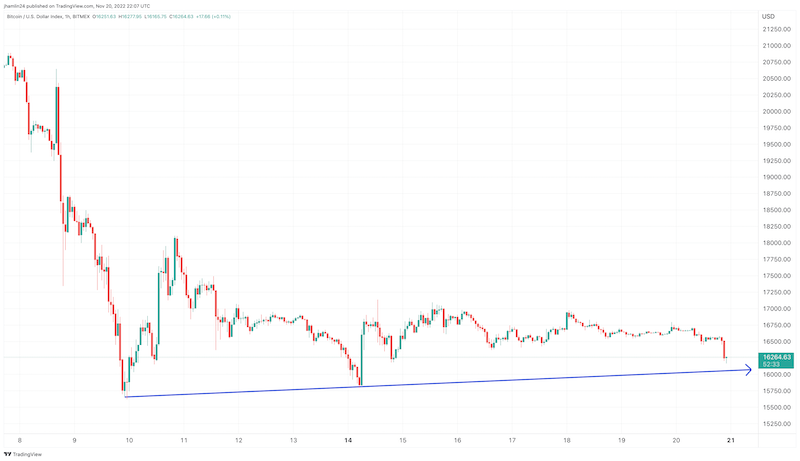FTX collapsed in the largest blowup in the crypto space ever. The story is nuanced, but it seems that SBF’s hedge fund, Alameda Research, lost a ton of money on risky bets, had undercollateralized loans, and then illegally used FTX depositor funds to try to get whole. When a balance sheet of Alameda Research was leaked, it showed that the majority of the assets were FTX’s own token, FTT. This caused significant concern and led to Binance’s chief CZ tweeting that he would sell all of their FTT token (~$500 million). This created a loss of trust in FTX and led to a bank run, whereby investors tried to withdraw more funds than FTX had liquid to process.
FTX declared bankruptcy and we are just starting to see the contagion effect. Investors and depositors, small and large, lost billions that will likely never be recovered. This has created distrust in the entire crypto sector, although the blame is on a few people and has nothing to do with Bitcoin itself. Still, this will likely set back the sector by a few years and hold prices much lower than they otherwise would be. The story is still unfolding and the conspiracy theories run deep.
The positive take is that the FTX event represents a cleansing of the crypto ecosystem, wiping out over-leveraged players and bad actors. It is also an abrupt reminder of the importance of self-custody, maintaining control of your crypto, and not trusting others to hold it for you. Even if you are earning interest by doing so, leaving your crypto with an exchange or lender like BlockFi, clearly comes with risks that most investors under-estimated. As the saying goes, “not your keys, not your crypto.”
We have long advocated for keeping your cryptocurrency on a hardware wallet, such as a Trezor, Ledger, or ColdCard. Trezor and Ledger are the easiest to use and the ColdCard offers greater security. Whichever you choose, be sure to purchase it directly from the manufacturer and not from a third party that could tamper with the device and later gain access to your crypto. And given that Ledger’s customer information was once hacked, we also recommend purchasing the hardware wallet with crypto and using a private mailbox or P.O. box so that your home address is never leaked.

The downside of the FTX debacle is that it may force regulators to enact onerous regulations on the industry. SEC commissioner Pierce said the demise of FTX can be a catalyst for more regulation. And while we think some regulatory clarity could be useful, we are likely to get an overreach that stifles innovation, provides investors will fewer options, and forces investors to transact overseas. Sadly, significant intellectual capital is also likely to relocate outside of the United States if the government overregulates.
Governments and central banks have never loved cryptocurrency. Bitcoin in particular represents competition to the dollar, which they can print unlimited quantities of while exporting the inflation effects globally. Bitcoin on the other hand has no centralized authority and has a strictly limited supply of 21 million coins. 19.2 million of those 21 million have already been created roughly 2 to 3 million of those are estimated to be lost or otherwise unrecoverable. This means to the true maximum supply of Bitcoin that is likely somewhere around 17 to 18 million, increasing the scarcity.
Governments cannot control Bitcoin and it gives humanity several advantages over unbacked, fractional reserve fiat money. While governments have thus far not cracked down too severely, the FTX blowup gives them cover to try to stop its growth. Even worse, governments globally are planning to implement central bank digital currencies (CBDCs) that have none of the key benefits of Bitcoin. Just the opposite, CBDCs will allow greater government control over money and over the citizenry. Some fear this could lead to governments being able to shut off your access to money if they don’t like what you say or how you spend your earnings. And this could lead to a social credit system like has been implemented in China, where the government has greater and greater control over your life and you have less and less freedom. It could easily devolve into a Black Mirror episode of Orwellian magnitude.
The important part to understand from this mess is that it was caused by a small group of bad actors and should not reflect negatively on Bitcoin or the wider cryptocurrency sector. It does reflect negatively on regulators that did not provide the clarity needed to bring crypto exchanges onshore and provide protections for investors. And it does reflect negatively on putting too much trust in centralized authorities, no matter how large they are or how professional they appear on the surface. I believe these revelations will likely lead to more peer-to-peer exchanges, increased usage of decentralized finance, and more individuals learning to safely custody their assets rather than trusting others.
It should also lead to greater due diligence from investors and a closer examination of the legitimacy of many cryptocurrencies that offer little to no utility, decentralization, or scarcity.
So, does this impact our outlook on Bitcoin and Ethereum as investments?
While we think there could be more downside in the near-term on contagion impacts, we remain very bullish on Bitcoin, Ethereum, and a select few quality cryptocurrencies over the medium and long term. We had already been reducing exposure to highly speculative coins in favor of Bitcoin and stablecoins in recent months. So, we have plenty of ammunition to buy the dip, but we certainly aren’t in a hurry to go all-in at this time. Macro conditions remain bearish and we are still seeing a high degree of correlation between cryptocurrencies and stocks. Until this correlation breaks or we turn bullish on stocks, we think the bias for crypto remains to the downside.
That being said, the Bitcoin price has held up remarkably well considering the magnitude of negative news in the past week. After the initial drop from $20,500 to under $16,000, the price has largely been trading sideways and consolidating between $16,500 and $17,000. This stability comes despite BlockFi freezing withdraws and considering declaring bankruptcy and reports that Genesis Trading needs a $1 billion infusion immediately.

So, while we reduced exposure to some of the more speculative altcoins in our portfolio, we are not selling our Bitcoin. At some point in the months ahead, we will get a clear signal of the FED’s intention to freeze rate hikes and then pivot to try to create a soft landing. When this happens, we could see a rebound across most asset classes, with cryptocurrencies leading the way. We may not have hit bottom yet, but we believe that we are getting close and that cryptocurrencies still have a bright future ahead.
Investors that missed the last run of Bitcoin toward $70,000 currently have an opportunity to buy around $16,000 or a 77% discount to the late 2021 highs. We don’t try to time the bottoms but employ a strategy of regular purchases to dollar cost average. This strategy has worked well for us over the past decade, even with the series of 80%+ crashes that Bitcoin has gone through. We believe this time will prove no different and that while the FTX mess might set back the timeline, Bitcoin is still headed to well over $100,000 over the next few years and $1,000,000 or more over the next decade.
Bitcoin is a new financial foundation for all of humanity with the aim of separating money from the state in an open and immutable manner that anyone can access. There will be bumps along the way and we are currently experiencing what is likely the worst event thus far, but we believe Bitcoin will survive this and come out the other side stronger.



